Developing Academic Skills: Time Management, Integrity, Resource Use
VerifiedAdded on 2023/01/05
|13
|3938
|77
Homework Assignment
AI Summary
This assignment, focused on developing academic skills, encompasses several key areas essential for academic success. Task 1 involves creating a personal timetable and exploring various time management techniques, emphasizing intentionality, prioritization, focus, structure, and self-awareness. Task 2 provides advice on effective resource usage and includes a reflective diary detailing personal experiences and skill development throughout the module. The diary highlights the development of public speaking skills and acknowledges both strengths and weaknesses of the approaches used. Task 3 summarizes resources, including an online article on climate change and a research paper on renewable energy sources. The assignment concludes with Task 4, which involves creating a poster on academic integrity.
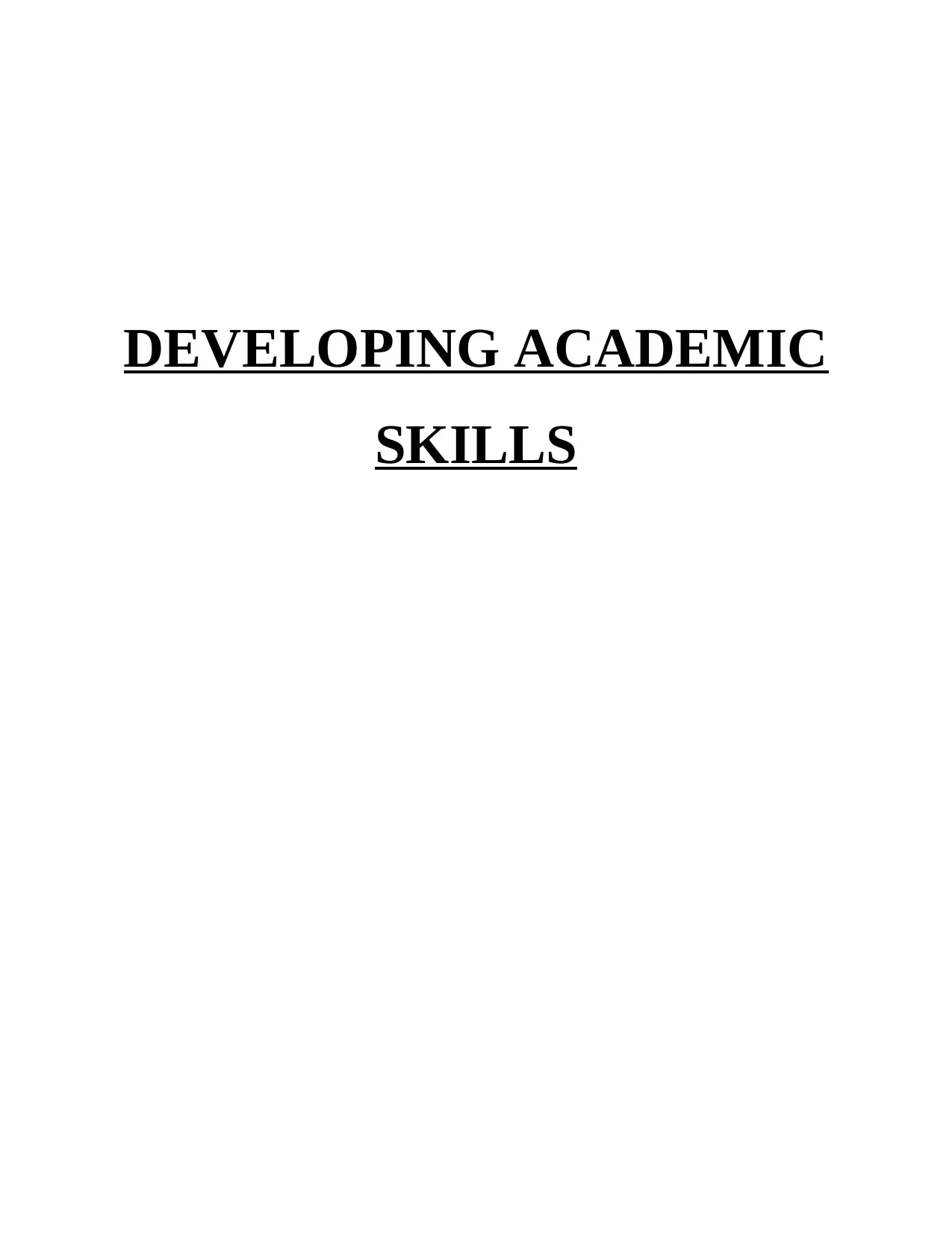
DEVELOPING ACADEMIC
SKILLS
SKILLS
Paraphrase This Document
Need a fresh take? Get an instant paraphrase of this document with our AI Paraphraser
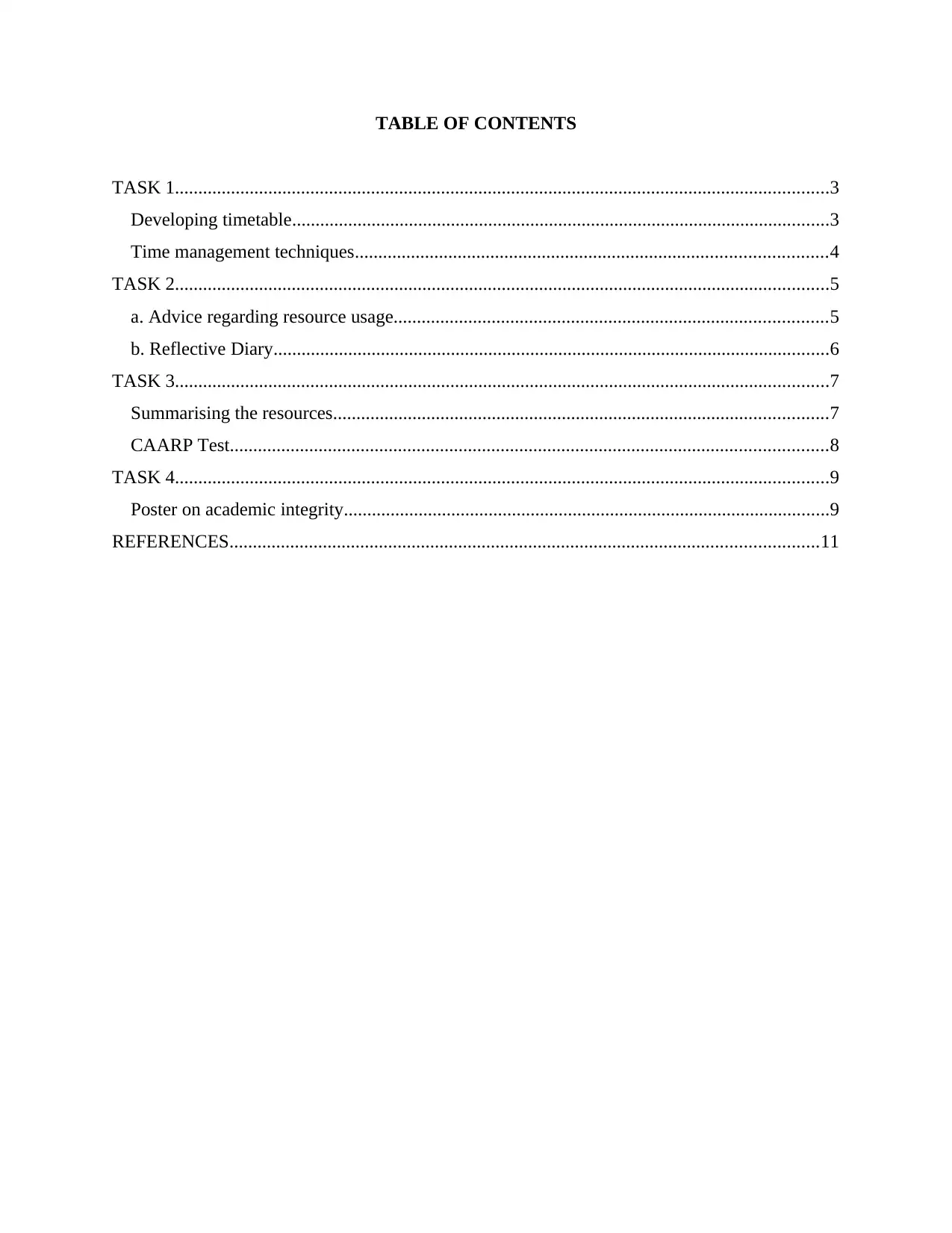
TABLE OF CONTENTS
TASK 1............................................................................................................................................3
Developing timetable...................................................................................................................3
Time management techniques.....................................................................................................4
TASK 2............................................................................................................................................5
a. Advice regarding resource usage.............................................................................................5
b. Reflective Diary.......................................................................................................................6
TASK 3............................................................................................................................................7
Summarising the resources..........................................................................................................7
CAARP Test................................................................................................................................8
TASK 4............................................................................................................................................9
Poster on academic integrity........................................................................................................9
REFERENCES..............................................................................................................................11
TASK 1............................................................................................................................................3
Developing timetable...................................................................................................................3
Time management techniques.....................................................................................................4
TASK 2............................................................................................................................................5
a. Advice regarding resource usage.............................................................................................5
b. Reflective Diary.......................................................................................................................6
TASK 3............................................................................................................................................7
Summarising the resources..........................................................................................................7
CAARP Test................................................................................................................................8
TASK 4............................................................................................................................................9
Poster on academic integrity........................................................................................................9
REFERENCES..............................................................................................................................11
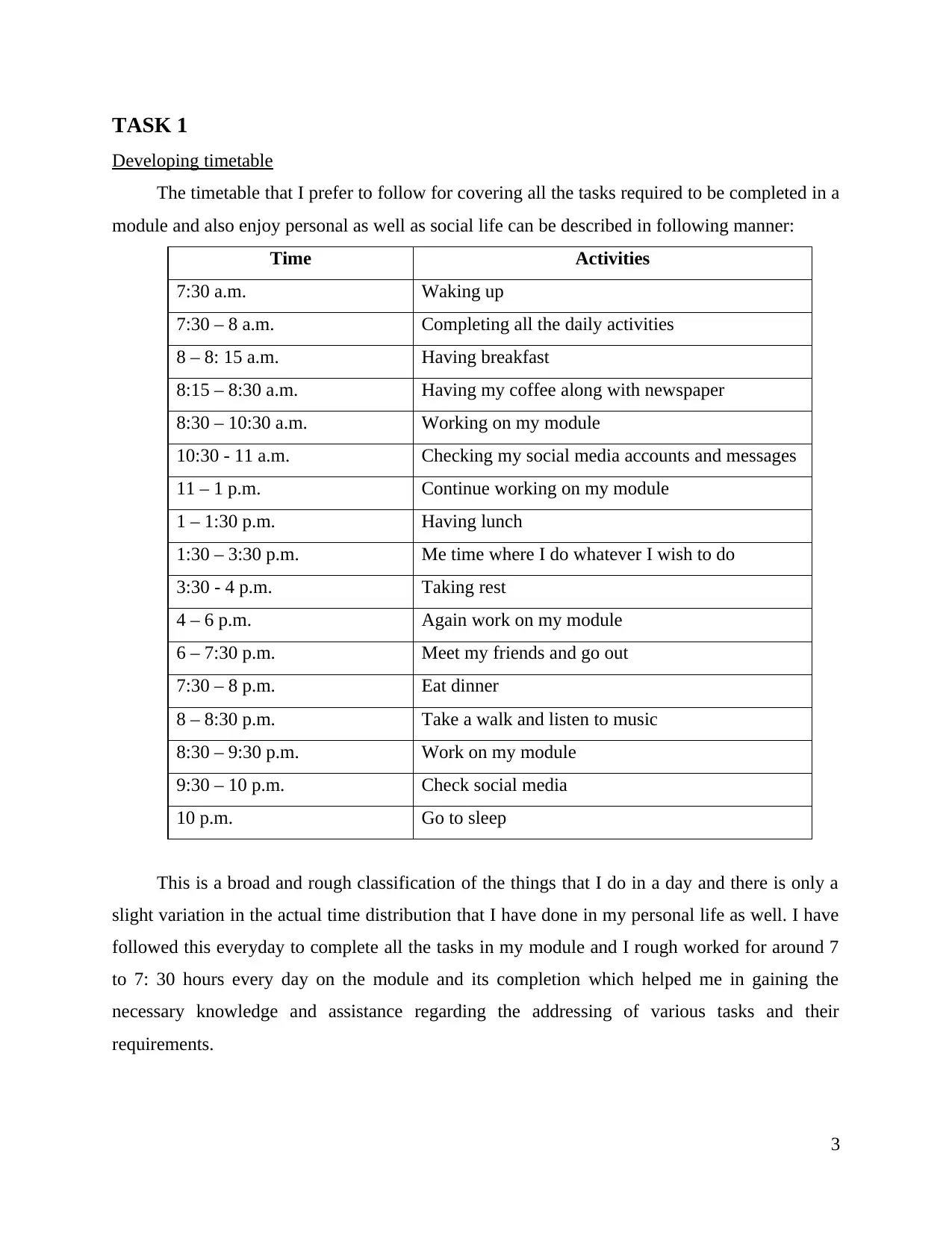
TASK 1
Developing timetable
The timetable that I prefer to follow for covering all the tasks required to be completed in a
module and also enjoy personal as well as social life can be described in following manner:
Time Activities
7:30 a.m. Waking up
7:30 – 8 a.m. Completing all the daily activities
8 – 8: 15 a.m. Having breakfast
8:15 – 8:30 a.m. Having my coffee along with newspaper
8:30 – 10:30 a.m. Working on my module
10:30 - 11 a.m. Checking my social media accounts and messages
11 – 1 p.m. Continue working on my module
1 – 1:30 p.m. Having lunch
1:30 – 3:30 p.m. Me time where I do whatever I wish to do
3:30 - 4 p.m. Taking rest
4 – 6 p.m. Again work on my module
6 – 7:30 p.m. Meet my friends and go out
7:30 – 8 p.m. Eat dinner
8 – 8:30 p.m. Take a walk and listen to music
8:30 – 9:30 p.m. Work on my module
9:30 – 10 p.m. Check social media
10 p.m. Go to sleep
This is a broad and rough classification of the things that I do in a day and there is only a
slight variation in the actual time distribution that I have done in my personal life as well. I have
followed this everyday to complete all the tasks in my module and I rough worked for around 7
to 7: 30 hours every day on the module and its completion which helped me in gaining the
necessary knowledge and assistance regarding the addressing of various tasks and their
requirements.
3
Developing timetable
The timetable that I prefer to follow for covering all the tasks required to be completed in a
module and also enjoy personal as well as social life can be described in following manner:
Time Activities
7:30 a.m. Waking up
7:30 – 8 a.m. Completing all the daily activities
8 – 8: 15 a.m. Having breakfast
8:15 – 8:30 a.m. Having my coffee along with newspaper
8:30 – 10:30 a.m. Working on my module
10:30 - 11 a.m. Checking my social media accounts and messages
11 – 1 p.m. Continue working on my module
1 – 1:30 p.m. Having lunch
1:30 – 3:30 p.m. Me time where I do whatever I wish to do
3:30 - 4 p.m. Taking rest
4 – 6 p.m. Again work on my module
6 – 7:30 p.m. Meet my friends and go out
7:30 – 8 p.m. Eat dinner
8 – 8:30 p.m. Take a walk and listen to music
8:30 – 9:30 p.m. Work on my module
9:30 – 10 p.m. Check social media
10 p.m. Go to sleep
This is a broad and rough classification of the things that I do in a day and there is only a
slight variation in the actual time distribution that I have done in my personal life as well. I have
followed this everyday to complete all the tasks in my module and I rough worked for around 7
to 7: 30 hours every day on the module and its completion which helped me in gaining the
necessary knowledge and assistance regarding the addressing of various tasks and their
requirements.
3
⊘ This is a preview!⊘
Do you want full access?
Subscribe today to unlock all pages.

Trusted by 1+ million students worldwide
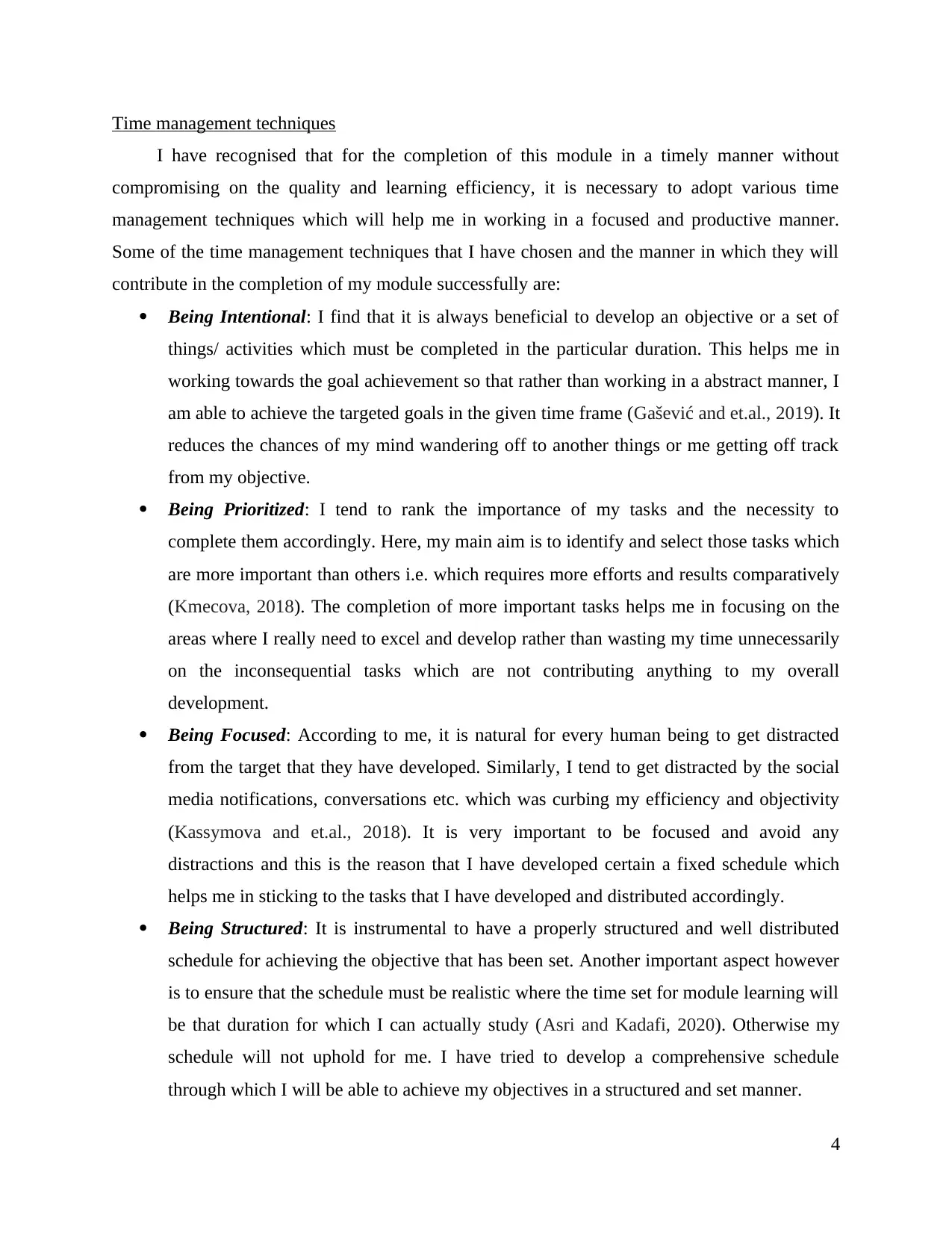
Time management techniques
I have recognised that for the completion of this module in a timely manner without
compromising on the quality and learning efficiency, it is necessary to adopt various time
management techniques which will help me in working in a focused and productive manner.
Some of the time management techniques that I have chosen and the manner in which they will
contribute in the completion of my module successfully are:
Being Intentional: I find that it is always beneficial to develop an objective or a set of
things/ activities which must be completed in the particular duration. This helps me in
working towards the goal achievement so that rather than working in a abstract manner, I
am able to achieve the targeted goals in the given time frame (Gašević and et.al., 2019). It
reduces the chances of my mind wandering off to another things or me getting off track
from my objective.
Being Prioritized: I tend to rank the importance of my tasks and the necessity to
complete them accordingly. Here, my main aim is to identify and select those tasks which
are more important than others i.e. which requires more efforts and results comparatively
(Kmecova, 2018). The completion of more important tasks helps me in focusing on the
areas where I really need to excel and develop rather than wasting my time unnecessarily
on the inconsequential tasks which are not contributing anything to my overall
development.
Being Focused: According to me, it is natural for every human being to get distracted
from the target that they have developed. Similarly, I tend to get distracted by the social
media notifications, conversations etc. which was curbing my efficiency and objectivity
(Kassymova and et.al., 2018). It is very important to be focused and avoid any
distractions and this is the reason that I have developed certain a fixed schedule which
helps me in sticking to the tasks that I have developed and distributed accordingly.
Being Structured: It is instrumental to have a properly structured and well distributed
schedule for achieving the objective that has been set. Another important aspect however
is to ensure that the schedule must be realistic where the time set for module learning will
be that duration for which I can actually study (Asri and Kadafi, 2020). Otherwise my
schedule will not uphold for me. I have tried to develop a comprehensive schedule
through which I will be able to achieve my objectives in a structured and set manner.
4
I have recognised that for the completion of this module in a timely manner without
compromising on the quality and learning efficiency, it is necessary to adopt various time
management techniques which will help me in working in a focused and productive manner.
Some of the time management techniques that I have chosen and the manner in which they will
contribute in the completion of my module successfully are:
Being Intentional: I find that it is always beneficial to develop an objective or a set of
things/ activities which must be completed in the particular duration. This helps me in
working towards the goal achievement so that rather than working in a abstract manner, I
am able to achieve the targeted goals in the given time frame (Gašević and et.al., 2019). It
reduces the chances of my mind wandering off to another things or me getting off track
from my objective.
Being Prioritized: I tend to rank the importance of my tasks and the necessity to
complete them accordingly. Here, my main aim is to identify and select those tasks which
are more important than others i.e. which requires more efforts and results comparatively
(Kmecova, 2018). The completion of more important tasks helps me in focusing on the
areas where I really need to excel and develop rather than wasting my time unnecessarily
on the inconsequential tasks which are not contributing anything to my overall
development.
Being Focused: According to me, it is natural for every human being to get distracted
from the target that they have developed. Similarly, I tend to get distracted by the social
media notifications, conversations etc. which was curbing my efficiency and objectivity
(Kassymova and et.al., 2018). It is very important to be focused and avoid any
distractions and this is the reason that I have developed certain a fixed schedule which
helps me in sticking to the tasks that I have developed and distributed accordingly.
Being Structured: It is instrumental to have a properly structured and well distributed
schedule for achieving the objective that has been set. Another important aspect however
is to ensure that the schedule must be realistic where the time set for module learning will
be that duration for which I can actually study (Asri and Kadafi, 2020). Otherwise my
schedule will not uphold for me. I have tried to develop a comprehensive schedule
through which I will be able to achieve my objectives in a structured and set manner.
4
Paraphrase This Document
Need a fresh take? Get an instant paraphrase of this document with our AI Paraphraser
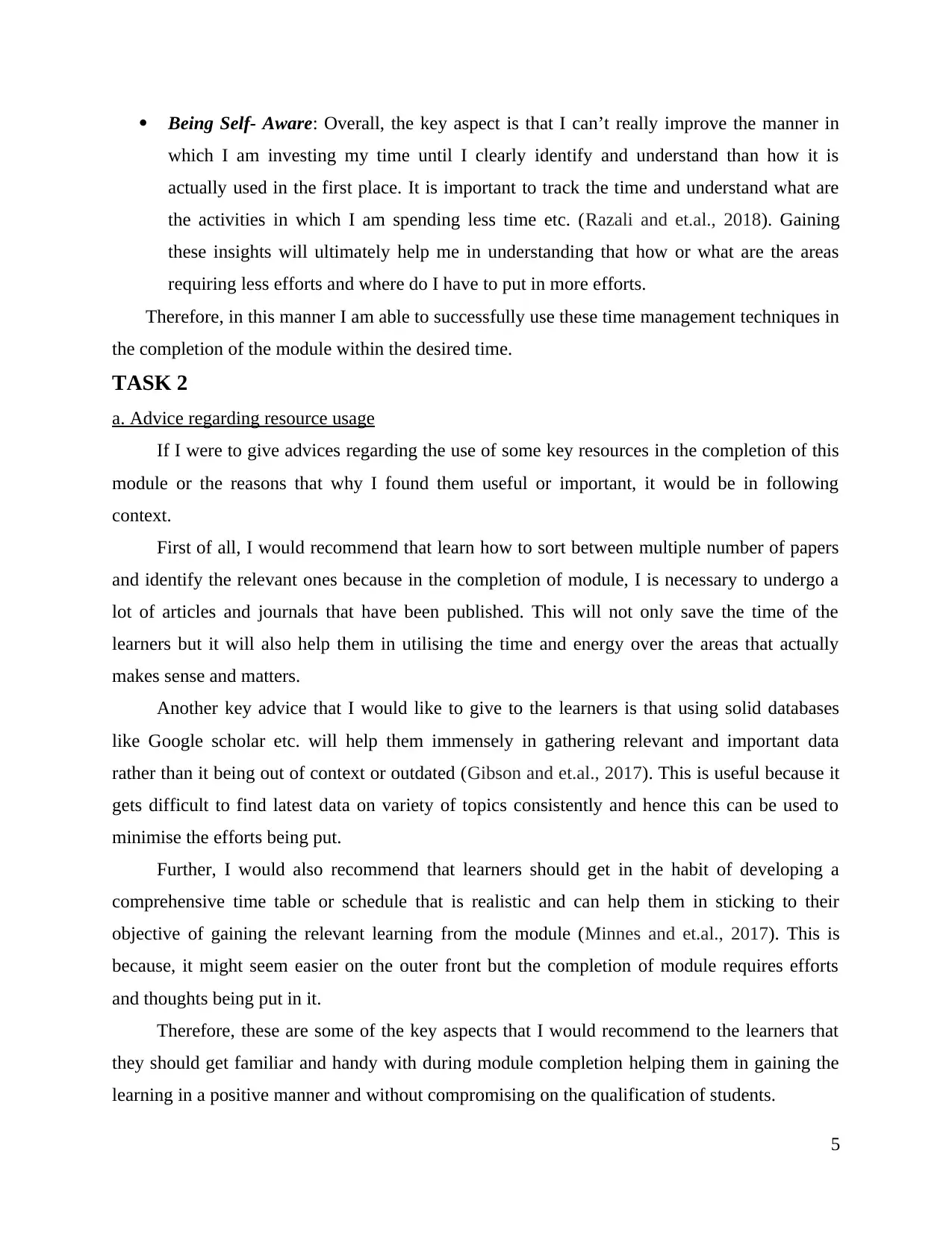
Being Self- Aware: Overall, the key aspect is that I can’t really improve the manner in
which I am investing my time until I clearly identify and understand than how it is
actually used in the first place. It is important to track the time and understand what are
the activities in which I am spending less time etc. (Razali and et.al., 2018). Gaining
these insights will ultimately help me in understanding that how or what are the areas
requiring less efforts and where do I have to put in more efforts.
Therefore, in this manner I am able to successfully use these time management techniques in
the completion of the module within the desired time.
TASK 2
a. Advice regarding resource usage
If I were to give advices regarding the use of some key resources in the completion of this
module or the reasons that why I found them useful or important, it would be in following
context.
First of all, I would recommend that learn how to sort between multiple number of papers
and identify the relevant ones because in the completion of module, I is necessary to undergo a
lot of articles and journals that have been published. This will not only save the time of the
learners but it will also help them in utilising the time and energy over the areas that actually
makes sense and matters.
Another key advice that I would like to give to the learners is that using solid databases
like Google scholar etc. will help them immensely in gathering relevant and important data
rather than it being out of context or outdated (Gibson and et.al., 2017). This is useful because it
gets difficult to find latest data on variety of topics consistently and hence this can be used to
minimise the efforts being put.
Further, I would also recommend that learners should get in the habit of developing a
comprehensive time table or schedule that is realistic and can help them in sticking to their
objective of gaining the relevant learning from the module (Minnes and et.al., 2017). This is
because, it might seem easier on the outer front but the completion of module requires efforts
and thoughts being put in it.
Therefore, these are some of the key aspects that I would recommend to the learners that
they should get familiar and handy with during module completion helping them in gaining the
learning in a positive manner and without compromising on the qualification of students.
5
which I am investing my time until I clearly identify and understand than how it is
actually used in the first place. It is important to track the time and understand what are
the activities in which I am spending less time etc. (Razali and et.al., 2018). Gaining
these insights will ultimately help me in understanding that how or what are the areas
requiring less efforts and where do I have to put in more efforts.
Therefore, in this manner I am able to successfully use these time management techniques in
the completion of the module within the desired time.
TASK 2
a. Advice regarding resource usage
If I were to give advices regarding the use of some key resources in the completion of this
module or the reasons that why I found them useful or important, it would be in following
context.
First of all, I would recommend that learn how to sort between multiple number of papers
and identify the relevant ones because in the completion of module, I is necessary to undergo a
lot of articles and journals that have been published. This will not only save the time of the
learners but it will also help them in utilising the time and energy over the areas that actually
makes sense and matters.
Another key advice that I would like to give to the learners is that using solid databases
like Google scholar etc. will help them immensely in gathering relevant and important data
rather than it being out of context or outdated (Gibson and et.al., 2017). This is useful because it
gets difficult to find latest data on variety of topics consistently and hence this can be used to
minimise the efforts being put.
Further, I would also recommend that learners should get in the habit of developing a
comprehensive time table or schedule that is realistic and can help them in sticking to their
objective of gaining the relevant learning from the module (Minnes and et.al., 2017). This is
because, it might seem easier on the outer front but the completion of module requires efforts
and thoughts being put in it.
Therefore, these are some of the key aspects that I would recommend to the learners that
they should get familiar and handy with during module completion helping them in gaining the
learning in a positive manner and without compromising on the qualification of students.
5
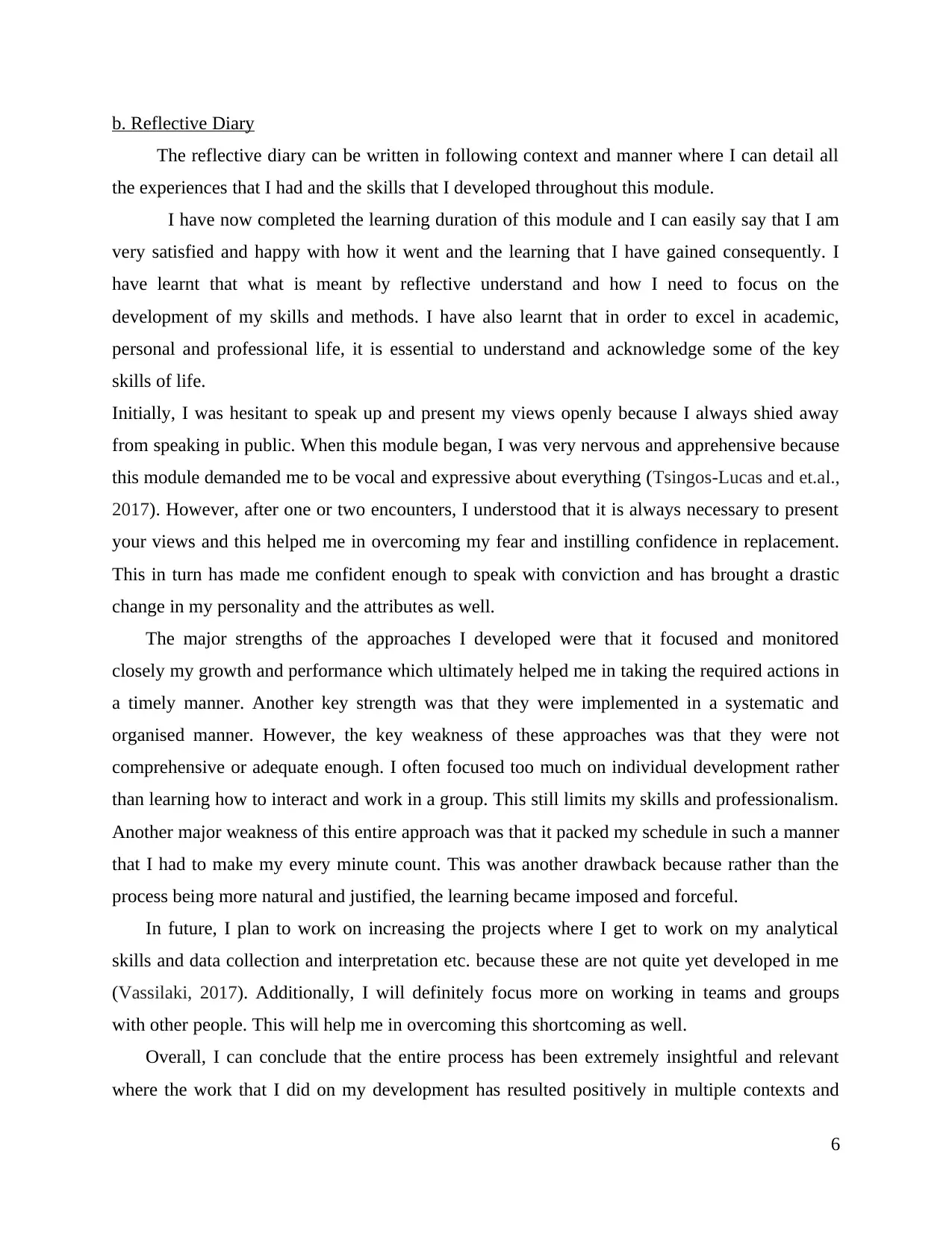
b. Reflective Diary
The reflective diary can be written in following context and manner where I can detail all
the experiences that I had and the skills that I developed throughout this module.
I have now completed the learning duration of this module and I can easily say that I am
very satisfied and happy with how it went and the learning that I have gained consequently. I
have learnt that what is meant by reflective understand and how I need to focus on the
development of my skills and methods. I have also learnt that in order to excel in academic,
personal and professional life, it is essential to understand and acknowledge some of the key
skills of life.
Initially, I was hesitant to speak up and present my views openly because I always shied away
from speaking in public. When this module began, I was very nervous and apprehensive because
this module demanded me to be vocal and expressive about everything (Tsingos-Lucas and et.al.,
2017). However, after one or two encounters, I understood that it is always necessary to present
your views and this helped me in overcoming my fear and instilling confidence in replacement.
This in turn has made me confident enough to speak with conviction and has brought a drastic
change in my personality and the attributes as well.
The major strengths of the approaches I developed were that it focused and monitored
closely my growth and performance which ultimately helped me in taking the required actions in
a timely manner. Another key strength was that they were implemented in a systematic and
organised manner. However, the key weakness of these approaches was that they were not
comprehensive or adequate enough. I often focused too much on individual development rather
than learning how to interact and work in a group. This still limits my skills and professionalism.
Another major weakness of this entire approach was that it packed my schedule in such a manner
that I had to make my every minute count. This was another drawback because rather than the
process being more natural and justified, the learning became imposed and forceful.
In future, I plan to work on increasing the projects where I get to work on my analytical
skills and data collection and interpretation etc. because these are not quite yet developed in me
(Vassilaki, 2017). Additionally, I will definitely focus more on working in teams and groups
with other people. This will help me in overcoming this shortcoming as well.
Overall, I can conclude that the entire process has been extremely insightful and relevant
where the work that I did on my development has resulted positively in multiple contexts and
6
The reflective diary can be written in following context and manner where I can detail all
the experiences that I had and the skills that I developed throughout this module.
I have now completed the learning duration of this module and I can easily say that I am
very satisfied and happy with how it went and the learning that I have gained consequently. I
have learnt that what is meant by reflective understand and how I need to focus on the
development of my skills and methods. I have also learnt that in order to excel in academic,
personal and professional life, it is essential to understand and acknowledge some of the key
skills of life.
Initially, I was hesitant to speak up and present my views openly because I always shied away
from speaking in public. When this module began, I was very nervous and apprehensive because
this module demanded me to be vocal and expressive about everything (Tsingos-Lucas and et.al.,
2017). However, after one or two encounters, I understood that it is always necessary to present
your views and this helped me in overcoming my fear and instilling confidence in replacement.
This in turn has made me confident enough to speak with conviction and has brought a drastic
change in my personality and the attributes as well.
The major strengths of the approaches I developed were that it focused and monitored
closely my growth and performance which ultimately helped me in taking the required actions in
a timely manner. Another key strength was that they were implemented in a systematic and
organised manner. However, the key weakness of these approaches was that they were not
comprehensive or adequate enough. I often focused too much on individual development rather
than learning how to interact and work in a group. This still limits my skills and professionalism.
Another major weakness of this entire approach was that it packed my schedule in such a manner
that I had to make my every minute count. This was another drawback because rather than the
process being more natural and justified, the learning became imposed and forceful.
In future, I plan to work on increasing the projects where I get to work on my analytical
skills and data collection and interpretation etc. because these are not quite yet developed in me
(Vassilaki, 2017). Additionally, I will definitely focus more on working in teams and groups
with other people. This will help me in overcoming this shortcoming as well.
Overall, I can conclude that the entire process has been extremely insightful and relevant
where the work that I did on my development has resulted positively in multiple contexts and
6
⊘ This is a preview!⊘
Do you want full access?
Subscribe today to unlock all pages.

Trusted by 1+ million students worldwide
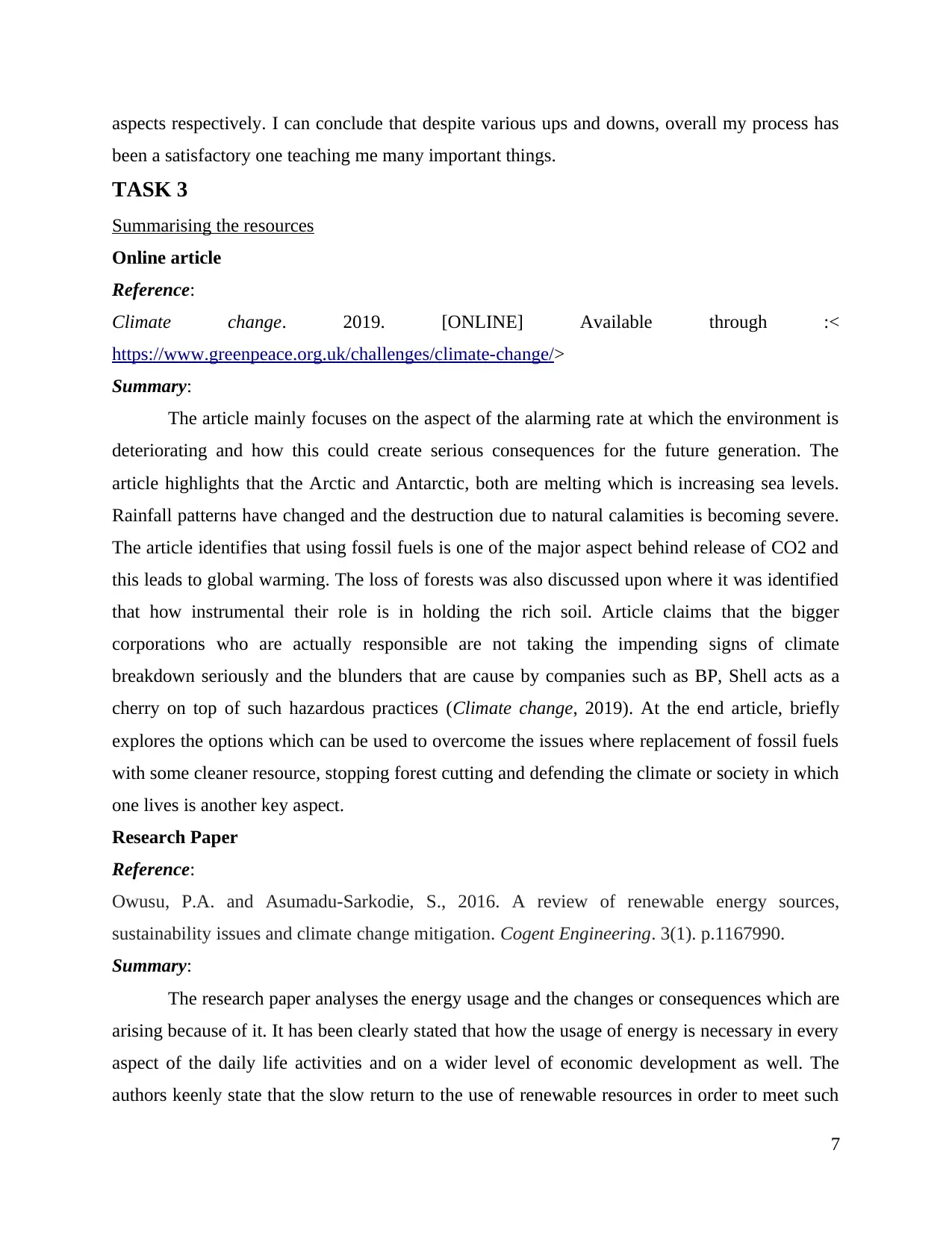
aspects respectively. I can conclude that despite various ups and downs, overall my process has
been a satisfactory one teaching me many important things.
TASK 3
Summarising the resources
Online article
Reference:
Climate change. 2019. [ONLINE] Available through :<
https://www.greenpeace.org.uk/challenges/climate-change/>
Summary:
The article mainly focuses on the aspect of the alarming rate at which the environment is
deteriorating and how this could create serious consequences for the future generation. The
article highlights that the Arctic and Antarctic, both are melting which is increasing sea levels.
Rainfall patterns have changed and the destruction due to natural calamities is becoming severe.
The article identifies that using fossil fuels is one of the major aspect behind release of CO2 and
this leads to global warming. The loss of forests was also discussed upon where it was identified
that how instrumental their role is in holding the rich soil. Article claims that the bigger
corporations who are actually responsible are not taking the impending signs of climate
breakdown seriously and the blunders that are cause by companies such as BP, Shell acts as a
cherry on top of such hazardous practices (Climate change, 2019). At the end article, briefly
explores the options which can be used to overcome the issues where replacement of fossil fuels
with some cleaner resource, stopping forest cutting and defending the climate or society in which
one lives is another key aspect.
Research Paper
Reference:
Owusu, P.A. and Asumadu-Sarkodie, S., 2016. A review of renewable energy sources,
sustainability issues and climate change mitigation. Cogent Engineering. 3(1). p.1167990.
Summary:
The research paper analyses the energy usage and the changes or consequences which are
arising because of it. It has been clearly stated that how the usage of energy is necessary in every
aspect of the daily life activities and on a wider level of economic development as well. The
authors keenly state that the slow return to the use of renewable resources in order to meet such
7
been a satisfactory one teaching me many important things.
TASK 3
Summarising the resources
Online article
Reference:
Climate change. 2019. [ONLINE] Available through :<
https://www.greenpeace.org.uk/challenges/climate-change/>
Summary:
The article mainly focuses on the aspect of the alarming rate at which the environment is
deteriorating and how this could create serious consequences for the future generation. The
article highlights that the Arctic and Antarctic, both are melting which is increasing sea levels.
Rainfall patterns have changed and the destruction due to natural calamities is becoming severe.
The article identifies that using fossil fuels is one of the major aspect behind release of CO2 and
this leads to global warming. The loss of forests was also discussed upon where it was identified
that how instrumental their role is in holding the rich soil. Article claims that the bigger
corporations who are actually responsible are not taking the impending signs of climate
breakdown seriously and the blunders that are cause by companies such as BP, Shell acts as a
cherry on top of such hazardous practices (Climate change, 2019). At the end article, briefly
explores the options which can be used to overcome the issues where replacement of fossil fuels
with some cleaner resource, stopping forest cutting and defending the climate or society in which
one lives is another key aspect.
Research Paper
Reference:
Owusu, P.A. and Asumadu-Sarkodie, S., 2016. A review of renewable energy sources,
sustainability issues and climate change mitigation. Cogent Engineering. 3(1). p.1167990.
Summary:
The research paper analyses the energy usage and the changes or consequences which are
arising because of it. It has been clearly stated that how the usage of energy is necessary in every
aspect of the daily life activities and on a wider level of economic development as well. The
authors keenly state that the slow return to the use of renewable resources in order to meet such
7
Paraphrase This Document
Need a fresh take? Get an instant paraphrase of this document with our AI Paraphraser
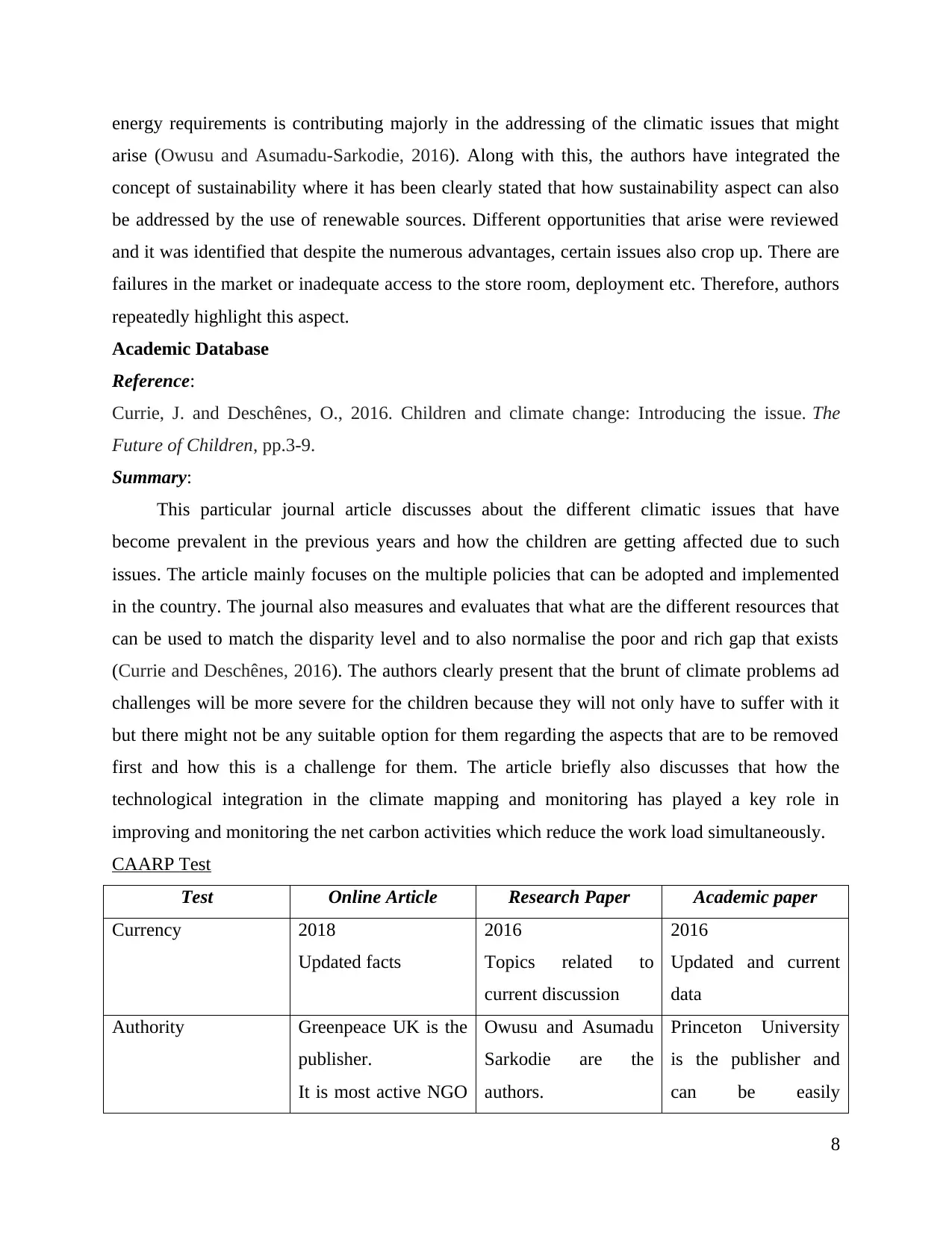
energy requirements is contributing majorly in the addressing of the climatic issues that might
arise (Owusu and Asumadu-Sarkodie, 2016). Along with this, the authors have integrated the
concept of sustainability where it has been clearly stated that how sustainability aspect can also
be addressed by the use of renewable sources. Different opportunities that arise were reviewed
and it was identified that despite the numerous advantages, certain issues also crop up. There are
failures in the market or inadequate access to the store room, deployment etc. Therefore, authors
repeatedly highlight this aspect.
Academic Database
Reference:
Currie, J. and Deschênes, O., 2016. Children and climate change: Introducing the issue. The
Future of Children, pp.3-9.
Summary:
This particular journal article discusses about the different climatic issues that have
become prevalent in the previous years and how the children are getting affected due to such
issues. The article mainly focuses on the multiple policies that can be adopted and implemented
in the country. The journal also measures and evaluates that what are the different resources that
can be used to match the disparity level and to also normalise the poor and rich gap that exists
(Currie and Deschênes, 2016). The authors clearly present that the brunt of climate problems ad
challenges will be more severe for the children because they will not only have to suffer with it
but there might not be any suitable option for them regarding the aspects that are to be removed
first and how this is a challenge for them. The article briefly also discusses that how the
technological integration in the climate mapping and monitoring has played a key role in
improving and monitoring the net carbon activities which reduce the work load simultaneously.
CAARP Test
Test Online Article Research Paper Academic paper
Currency 2018
Updated facts
2016
Topics related to
current discussion
2016
Updated and current
data
Authority Greenpeace UK is the
publisher.
It is most active NGO
Owusu and Asumadu
Sarkodie are the
authors.
Princeton University
is the publisher and
can be easily
8
arise (Owusu and Asumadu-Sarkodie, 2016). Along with this, the authors have integrated the
concept of sustainability where it has been clearly stated that how sustainability aspect can also
be addressed by the use of renewable sources. Different opportunities that arise were reviewed
and it was identified that despite the numerous advantages, certain issues also crop up. There are
failures in the market or inadequate access to the store room, deployment etc. Therefore, authors
repeatedly highlight this aspect.
Academic Database
Reference:
Currie, J. and Deschênes, O., 2016. Children and climate change: Introducing the issue. The
Future of Children, pp.3-9.
Summary:
This particular journal article discusses about the different climatic issues that have
become prevalent in the previous years and how the children are getting affected due to such
issues. The article mainly focuses on the multiple policies that can be adopted and implemented
in the country. The journal also measures and evaluates that what are the different resources that
can be used to match the disparity level and to also normalise the poor and rich gap that exists
(Currie and Deschênes, 2016). The authors clearly present that the brunt of climate problems ad
challenges will be more severe for the children because they will not only have to suffer with it
but there might not be any suitable option for them regarding the aspects that are to be removed
first and how this is a challenge for them. The article briefly also discusses that how the
technological integration in the climate mapping and monitoring has played a key role in
improving and monitoring the net carbon activities which reduce the work load simultaneously.
CAARP Test
Test Online Article Research Paper Academic paper
Currency 2018
Updated facts
2016
Topics related to
current discussion
2016
Updated and current
data
Authority Greenpeace UK is the
publisher.
It is most active NGO
Owusu and Asumadu
Sarkodie are the
authors.
Princeton University
is the publisher and
can be easily
8
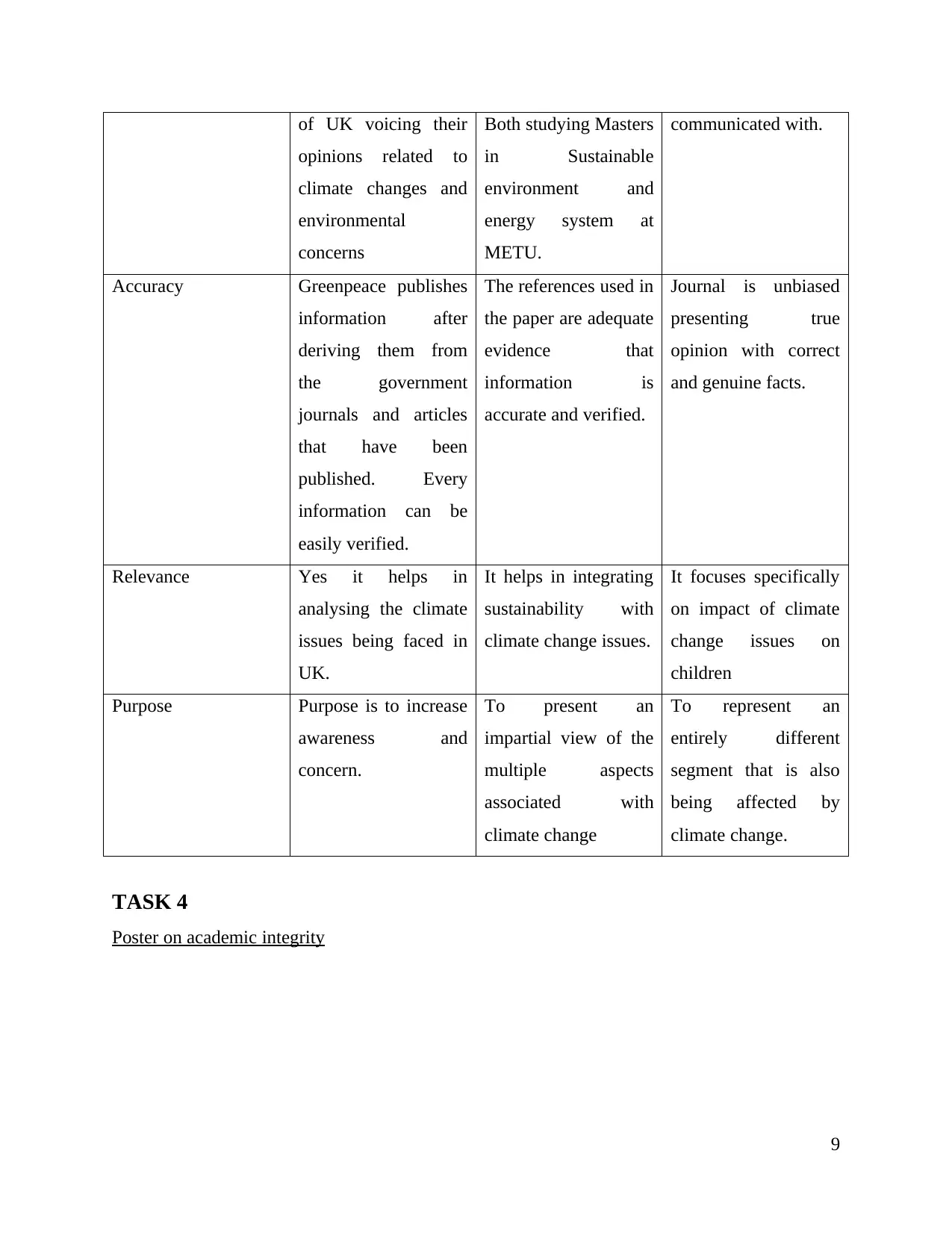
of UK voicing their
opinions related to
climate changes and
environmental
concerns
Both studying Masters
in Sustainable
environment and
energy system at
METU.
communicated with.
Accuracy Greenpeace publishes
information after
deriving them from
the government
journals and articles
that have been
published. Every
information can be
easily verified.
The references used in
the paper are adequate
evidence that
information is
accurate and verified.
Journal is unbiased
presenting true
opinion with correct
and genuine facts.
Relevance Yes it helps in
analysing the climate
issues being faced in
UK.
It helps in integrating
sustainability with
climate change issues.
It focuses specifically
on impact of climate
change issues on
children
Purpose Purpose is to increase
awareness and
concern.
To present an
impartial view of the
multiple aspects
associated with
climate change
To represent an
entirely different
segment that is also
being affected by
climate change.
TASK 4
Poster on academic integrity
9
opinions related to
climate changes and
environmental
concerns
Both studying Masters
in Sustainable
environment and
energy system at
METU.
communicated with.
Accuracy Greenpeace publishes
information after
deriving them from
the government
journals and articles
that have been
published. Every
information can be
easily verified.
The references used in
the paper are adequate
evidence that
information is
accurate and verified.
Journal is unbiased
presenting true
opinion with correct
and genuine facts.
Relevance Yes it helps in
analysing the climate
issues being faced in
UK.
It helps in integrating
sustainability with
climate change issues.
It focuses specifically
on impact of climate
change issues on
children
Purpose Purpose is to increase
awareness and
concern.
To present an
impartial view of the
multiple aspects
associated with
climate change
To represent an
entirely different
segment that is also
being affected by
climate change.
TASK 4
Poster on academic integrity
9
⊘ This is a preview!⊘
Do you want full access?
Subscribe today to unlock all pages.

Trusted by 1+ million students worldwide
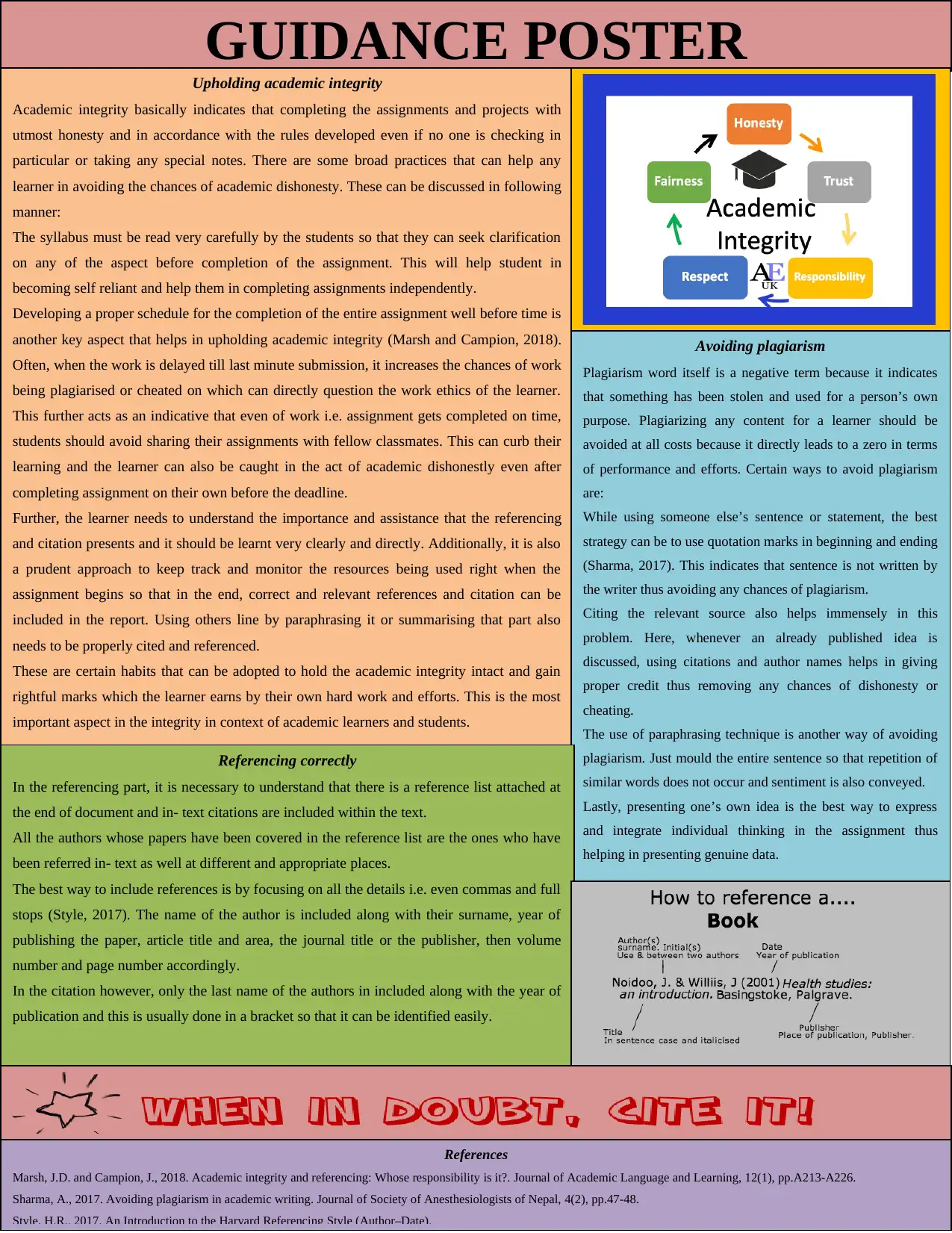
10
GUIDANCE POSTER
Upholding academic integrity
Academic integrity basically indicates that completing the assignments and projects with
utmost honesty and in accordance with the rules developed even if no one is checking in
particular or taking any special notes. There are some broad practices that can help any
learner in avoiding the chances of academic dishonesty. These can be discussed in following
manner:
The syllabus must be read very carefully by the students so that they can seek clarification
on any of the aspect before completion of the assignment. This will help student in
becoming self reliant and help them in completing assignments independently.
Developing a proper schedule for the completion of the entire assignment well before time is
another key aspect that helps in upholding academic integrity (Marsh and Campion, 2018).
Often, when the work is delayed till last minute submission, it increases the chances of work
being plagiarised or cheated on which can directly question the work ethics of the learner.
This further acts as an indicative that even of work i.e. assignment gets completed on time,
students should avoid sharing their assignments with fellow classmates. This can curb their
learning and the learner can also be caught in the act of academic dishonestly even after
completing assignment on their own before the deadline.
Further, the learner needs to understand the importance and assistance that the referencing
and citation presents and it should be learnt very clearly and directly. Additionally, it is also
a prudent approach to keep track and monitor the resources being used right when the
assignment begins so that in the end, correct and relevant references and citation can be
included in the report. Using others line by paraphrasing it or summarising that part also
needs to be properly cited and referenced.
These are certain habits that can be adopted to hold the academic integrity intact and gain
rightful marks which the learner earns by their own hard work and efforts. This is the most
important aspect in the integrity in context of academic learners and students.
References
Marsh, J.D. and Campion, J., 2018. Academic integrity and referencing: Whose responsibility is it?. Journal of Academic Language and Learning, 12(1), pp.A213-A226.
Sharma, A., 2017. Avoiding plagiarism in academic writing. Journal of Society of Anesthesiologists of Nepal, 4(2), pp.47-48.
Style, H.R., 2017. An Introduction to the Harvard Referencing Style (Author–Date).
Avoiding plagiarism
Plagiarism word itself is a negative term because it indicates
that something has been stolen and used for a person’s own
purpose. Plagiarizing any content for a learner should be
avoided at all costs because it directly leads to a zero in terms
of performance and efforts. Certain ways to avoid plagiarism
are:
While using someone else’s sentence or statement, the best
strategy can be to use quotation marks in beginning and ending
(Sharma, 2017). This indicates that sentence is not written by
the writer thus avoiding any chances of plagiarism.
Citing the relevant source also helps immensely in this
problem. Here, whenever an already published idea is
discussed, using citations and author names helps in giving
proper credit thus removing any chances of dishonesty or
cheating.
The use of paraphrasing technique is another way of avoiding
plagiarism. Just mould the entire sentence so that repetition of
similar words does not occur and sentiment is also conveyed.
Lastly, presenting one’s own idea is the best way to express
and integrate individual thinking in the assignment thus
helping in presenting genuine data.
Referencing correctly
In the referencing part, it is necessary to understand that there is a reference list attached at
the end of document and in- text citations are included within the text.
All the authors whose papers have been covered in the reference list are the ones who have
been referred in- text as well at different and appropriate places.
The best way to include references is by focusing on all the details i.e. even commas and full
stops (Style, 2017). The name of the author is included along with their surname, year of
publishing the paper, article title and area, the journal title or the publisher, then volume
number and page number accordingly.
In the citation however, only the last name of the authors in included along with the year of
publication and this is usually done in a bracket so that it can be identified easily.
GUIDANCE POSTER
Upholding academic integrity
Academic integrity basically indicates that completing the assignments and projects with
utmost honesty and in accordance with the rules developed even if no one is checking in
particular or taking any special notes. There are some broad practices that can help any
learner in avoiding the chances of academic dishonesty. These can be discussed in following
manner:
The syllabus must be read very carefully by the students so that they can seek clarification
on any of the aspect before completion of the assignment. This will help student in
becoming self reliant and help them in completing assignments independently.
Developing a proper schedule for the completion of the entire assignment well before time is
another key aspect that helps in upholding academic integrity (Marsh and Campion, 2018).
Often, when the work is delayed till last minute submission, it increases the chances of work
being plagiarised or cheated on which can directly question the work ethics of the learner.
This further acts as an indicative that even of work i.e. assignment gets completed on time,
students should avoid sharing their assignments with fellow classmates. This can curb their
learning and the learner can also be caught in the act of academic dishonestly even after
completing assignment on their own before the deadline.
Further, the learner needs to understand the importance and assistance that the referencing
and citation presents and it should be learnt very clearly and directly. Additionally, it is also
a prudent approach to keep track and monitor the resources being used right when the
assignment begins so that in the end, correct and relevant references and citation can be
included in the report. Using others line by paraphrasing it or summarising that part also
needs to be properly cited and referenced.
These are certain habits that can be adopted to hold the academic integrity intact and gain
rightful marks which the learner earns by their own hard work and efforts. This is the most
important aspect in the integrity in context of academic learners and students.
References
Marsh, J.D. and Campion, J., 2018. Academic integrity and referencing: Whose responsibility is it?. Journal of Academic Language and Learning, 12(1), pp.A213-A226.
Sharma, A., 2017. Avoiding plagiarism in academic writing. Journal of Society of Anesthesiologists of Nepal, 4(2), pp.47-48.
Style, H.R., 2017. An Introduction to the Harvard Referencing Style (Author–Date).
Avoiding plagiarism
Plagiarism word itself is a negative term because it indicates
that something has been stolen and used for a person’s own
purpose. Plagiarizing any content for a learner should be
avoided at all costs because it directly leads to a zero in terms
of performance and efforts. Certain ways to avoid plagiarism
are:
While using someone else’s sentence or statement, the best
strategy can be to use quotation marks in beginning and ending
(Sharma, 2017). This indicates that sentence is not written by
the writer thus avoiding any chances of plagiarism.
Citing the relevant source also helps immensely in this
problem. Here, whenever an already published idea is
discussed, using citations and author names helps in giving
proper credit thus removing any chances of dishonesty or
cheating.
The use of paraphrasing technique is another way of avoiding
plagiarism. Just mould the entire sentence so that repetition of
similar words does not occur and sentiment is also conveyed.
Lastly, presenting one’s own idea is the best way to express
and integrate individual thinking in the assignment thus
helping in presenting genuine data.
Referencing correctly
In the referencing part, it is necessary to understand that there is a reference list attached at
the end of document and in- text citations are included within the text.
All the authors whose papers have been covered in the reference list are the ones who have
been referred in- text as well at different and appropriate places.
The best way to include references is by focusing on all the details i.e. even commas and full
stops (Style, 2017). The name of the author is included along with their surname, year of
publishing the paper, article title and area, the journal title or the publisher, then volume
number and page number accordingly.
In the citation however, only the last name of the authors in included along with the year of
publication and this is usually done in a bracket so that it can be identified easily.
Paraphrase This Document
Need a fresh take? Get an instant paraphrase of this document with our AI Paraphraser
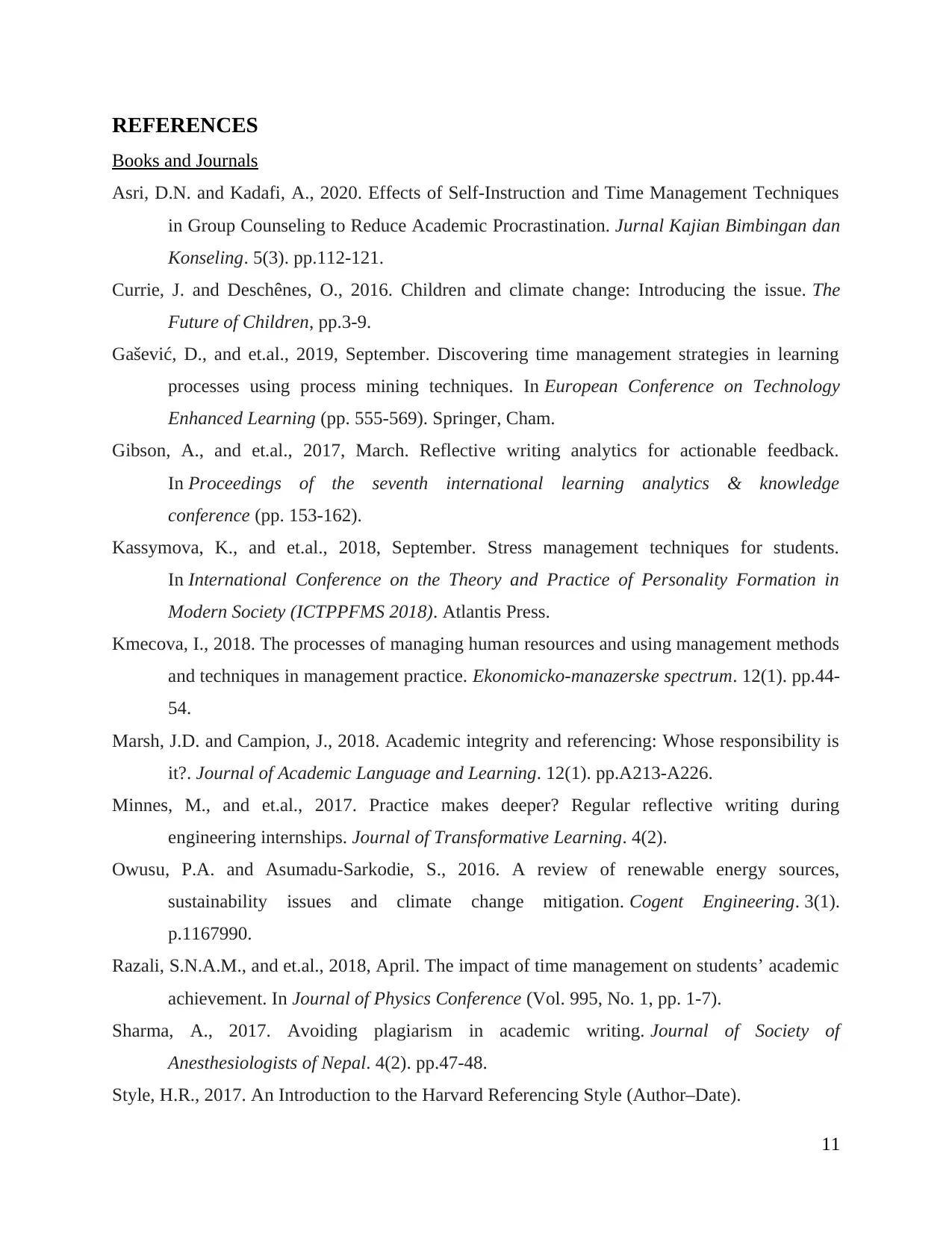
REFERENCES
Books and Journals
Asri, D.N. and Kadafi, A., 2020. Effects of Self-Instruction and Time Management Techniques
in Group Counseling to Reduce Academic Procrastination. Jurnal Kajian Bimbingan dan
Konseling. 5(3). pp.112-121.
Currie, J. and Deschênes, O., 2016. Children and climate change: Introducing the issue. The
Future of Children, pp.3-9.
Gašević, D., and et.al., 2019, September. Discovering time management strategies in learning
processes using process mining techniques. In European Conference on Technology
Enhanced Learning (pp. 555-569). Springer, Cham.
Gibson, A., and et.al., 2017, March. Reflective writing analytics for actionable feedback.
In Proceedings of the seventh international learning analytics & knowledge
conference (pp. 153-162).
Kassymova, K., and et.al., 2018, September. Stress management techniques for students.
In International Conference on the Theory and Practice of Personality Formation in
Modern Society (ICTPPFMS 2018). Atlantis Press.
Kmecova, I., 2018. The processes of managing human resources and using management methods
and techniques in management practice. Ekonomicko-manazerske spectrum. 12(1). pp.44-
54.
Marsh, J.D. and Campion, J., 2018. Academic integrity and referencing: Whose responsibility is
it?. Journal of Academic Language and Learning. 12(1). pp.A213-A226.
Minnes, M., and et.al., 2017. Practice makes deeper? Regular reflective writing during
engineering internships. Journal of Transformative Learning. 4(2).
Owusu, P.A. and Asumadu-Sarkodie, S., 2016. A review of renewable energy sources,
sustainability issues and climate change mitigation. Cogent Engineering. 3(1).
p.1167990.
Razali, S.N.A.M., and et.al., 2018, April. The impact of time management on students’ academic
achievement. In Journal of Physics Conference (Vol. 995, No. 1, pp. 1-7).
Sharma, A., 2017. Avoiding plagiarism in academic writing. Journal of Society of
Anesthesiologists of Nepal. 4(2). pp.47-48.
Style, H.R., 2017. An Introduction to the Harvard Referencing Style (Author–Date).
11
Books and Journals
Asri, D.N. and Kadafi, A., 2020. Effects of Self-Instruction and Time Management Techniques
in Group Counseling to Reduce Academic Procrastination. Jurnal Kajian Bimbingan dan
Konseling. 5(3). pp.112-121.
Currie, J. and Deschênes, O., 2016. Children and climate change: Introducing the issue. The
Future of Children, pp.3-9.
Gašević, D., and et.al., 2019, September. Discovering time management strategies in learning
processes using process mining techniques. In European Conference on Technology
Enhanced Learning (pp. 555-569). Springer, Cham.
Gibson, A., and et.al., 2017, March. Reflective writing analytics for actionable feedback.
In Proceedings of the seventh international learning analytics & knowledge
conference (pp. 153-162).
Kassymova, K., and et.al., 2018, September. Stress management techniques for students.
In International Conference on the Theory and Practice of Personality Formation in
Modern Society (ICTPPFMS 2018). Atlantis Press.
Kmecova, I., 2018. The processes of managing human resources and using management methods
and techniques in management practice. Ekonomicko-manazerske spectrum. 12(1). pp.44-
54.
Marsh, J.D. and Campion, J., 2018. Academic integrity and referencing: Whose responsibility is
it?. Journal of Academic Language and Learning. 12(1). pp.A213-A226.
Minnes, M., and et.al., 2017. Practice makes deeper? Regular reflective writing during
engineering internships. Journal of Transformative Learning. 4(2).
Owusu, P.A. and Asumadu-Sarkodie, S., 2016. A review of renewable energy sources,
sustainability issues and climate change mitigation. Cogent Engineering. 3(1).
p.1167990.
Razali, S.N.A.M., and et.al., 2018, April. The impact of time management on students’ academic
achievement. In Journal of Physics Conference (Vol. 995, No. 1, pp. 1-7).
Sharma, A., 2017. Avoiding plagiarism in academic writing. Journal of Society of
Anesthesiologists of Nepal. 4(2). pp.47-48.
Style, H.R., 2017. An Introduction to the Harvard Referencing Style (Author–Date).
11
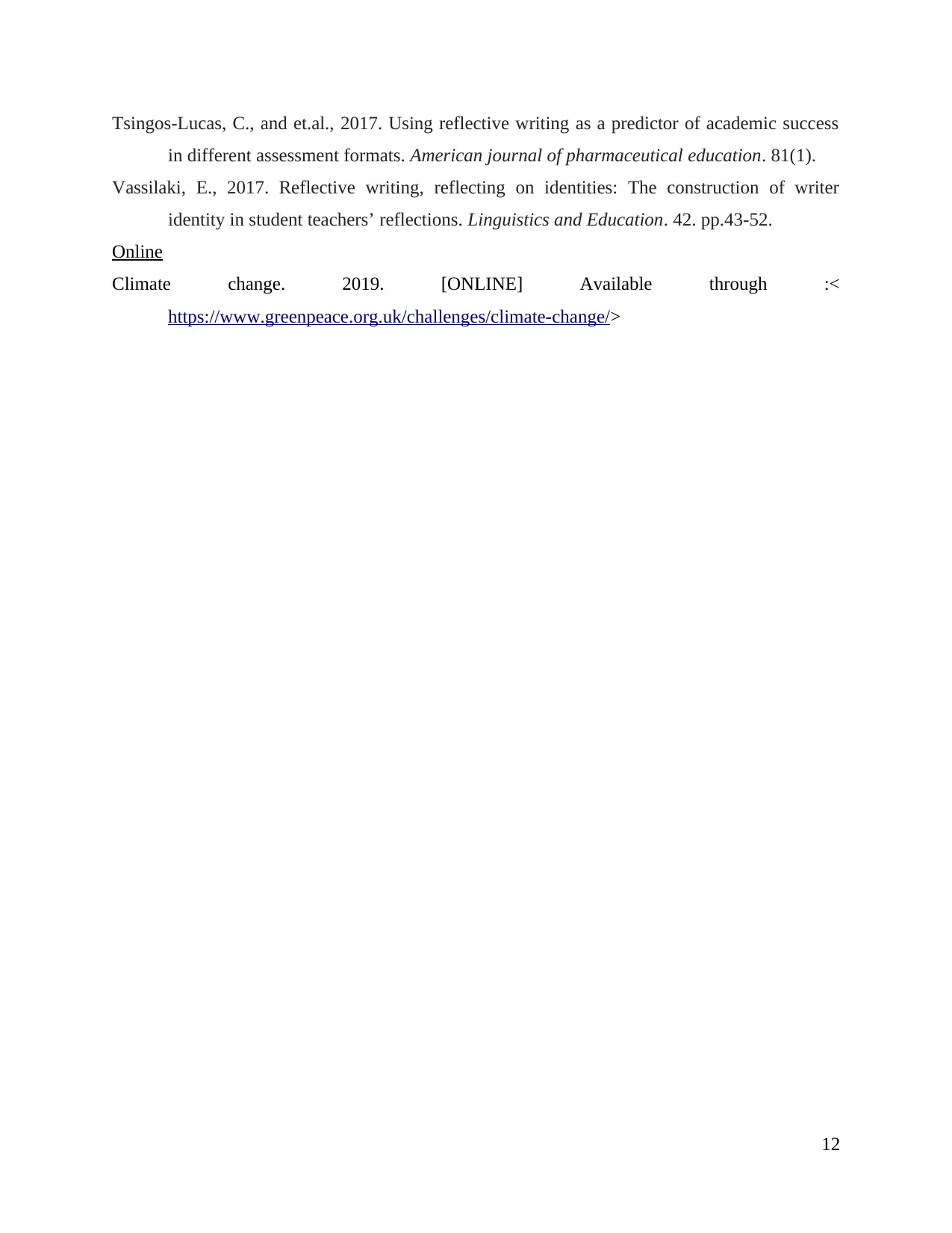
Tsingos-Lucas, C., and et.al., 2017. Using reflective writing as a predictor of academic success
in different assessment formats. American journal of pharmaceutical education. 81(1).
Vassilaki, E., 2017. Reflective writing, reflecting on identities: The construction of writer
identity in student teachers’ reflections. Linguistics and Education. 42. pp.43-52.
Online
Climate change. 2019. [ONLINE] Available through :<
https://www.greenpeace.org.uk/challenges/climate-change/>
12
in different assessment formats. American journal of pharmaceutical education. 81(1).
Vassilaki, E., 2017. Reflective writing, reflecting on identities: The construction of writer
identity in student teachers’ reflections. Linguistics and Education. 42. pp.43-52.
Online
Climate change. 2019. [ONLINE] Available through :<
https://www.greenpeace.org.uk/challenges/climate-change/>
12
⊘ This is a preview!⊘
Do you want full access?
Subscribe today to unlock all pages.

Trusted by 1+ million students worldwide
1 out of 13
Related Documents
Your All-in-One AI-Powered Toolkit for Academic Success.
+13062052269
info@desklib.com
Available 24*7 on WhatsApp / Email
![[object Object]](/_next/static/media/star-bottom.7253800d.svg)
Unlock your academic potential
Copyright © 2020–2026 A2Z Services. All Rights Reserved. Developed and managed by ZUCOL.


